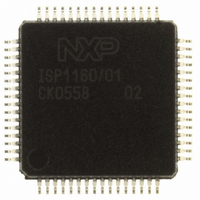ISP1160BD01TM ST-Ericsson Inc, ISP1160BD01TM Datasheet - Page 13

ISP1160BD01TM
Manufacturer Part Number
ISP1160BD01TM
Description
IC USB HOST CTRL FULL-SPD 64LQFP
Manufacturer
ST-Ericsson Inc
Datasheet
1.ISP1160BM01FE.pdf
(89 pages)
Specifications of ISP1160BD01TM
Controller Type
USB 2.0 Controller
Interface
Parallel
Voltage - Supply
3.3V, 5V
Current - Supply
47mA
Operating Temperature
-40°C ~ 85°C
Mounting Type
Surface Mount
Package / Case
64-LQFP
Lead Free Status / RoHS Status
Lead free / RoHS Compliant
Other names
568-1878-2
ISP1160BD/01,118
ISP1160BD01-T
ISP1160BD/01,118
ISP1160BD01-T
Available stocks
Company
Part Number
Manufacturer
Quantity
Price
Company:
Part Number:
ISP1160BD01TM
Manufacturer:
ST-Ericsson Inc
Quantity:
10 000
Part Number:
ISP1160BD01TM
Manufacturer:
ST
Quantity:
20 000
Philips Semiconductors
9397 750 13963
Product data
Fig 9. Internal FIFO buffer RAM access cycle.
write command
(16 bits)
8.5 FIFO buffer RAM access by DMA mode
Figure 9
write cycle, the microprocessor first writes the FIFO buffer RAM’s command code to
the command port, and then writes the data words one by one to the data port until
half of the transfer’s byte count is reached. The HcTransferCounter register (22H to
read, A2H to write) is used to specify the byte count of a FIFO buffer RAM’s read
cycle or write cycle. Every access cycle must be in the same access direction. The
read cycle procedure is similar to the write cycle.
The DMA interface between a microprocessor and the ISP1160 is shown in
When doing a DMA transfer, at the beginning of every burst the ISP1160 outputs a
DMA request to the microprocessor via pin DREQ. After receiving this signal, the
microprocessor will reply with a DMA acknowledge to the ISP1160 via pin DACK_N,
and at the same time, execute the DMA transfer through the data bus. In the DMA
mode, the microprocessor must issue a read or write signal to the ISP1160’s
pins RD_N or WR_N. The ISP1160 will repeat the DMA cycles until it receives an
EOT signal to terminate the DMA transfer.
The ISP1160 supports both external and internal EOT signals. The external EOT
signal is received as input on pin EOT, and generally comes from the external
microprocessor. The internal EOT signal is generated inside the ISP1160.
To select either EOT method, set the appropriate DMA configuration register (see
Section
HcDMAConfiguration register (21H to read, A1H to write) to logic 1 will enable the
DMA counter for DMA transfer. When the DMA counter reaches the value of the
HcTransferCounter register, the internal EOT signal will be generated to terminate the
DMA transfer.
The ISP1160 supports either single-cycle DMA operation or burst mode DMA
operation; see
10.4.2). For example, setting DMACounterSelect (bit 2) of the
shows a complete access cycle of the HC internal FIFO buffer RAM. For a
FIFO buffer RAM access cycle (transfer counter = 2N)
read/write data
#1 (16 bits)
Figure 10
Rev. 05 — 24 December 2004
and
Figure
read/write data
#2 (16 bits)
11.
Embedded USB Host Controller
© Koninklijke Philips Electronics N.V. 2004. All rights reserved.
read/write data
#N (16 bits)
ISP1160
MGT941
t
Figure
12 of 88
4.
















